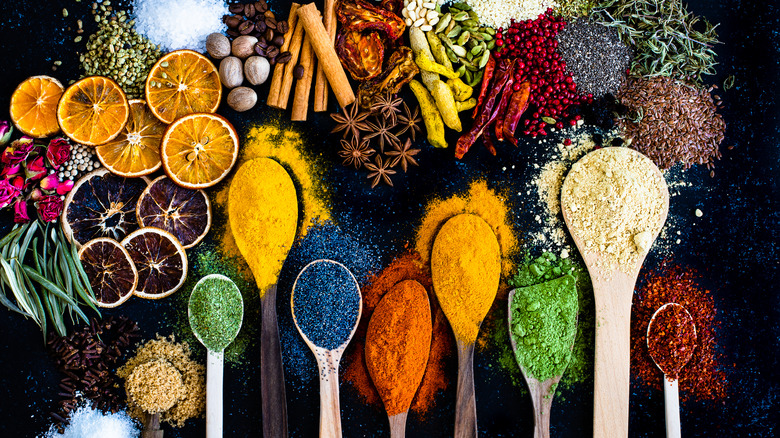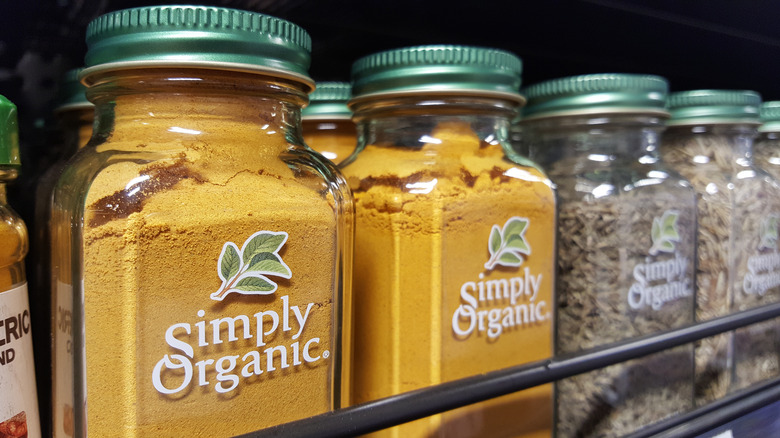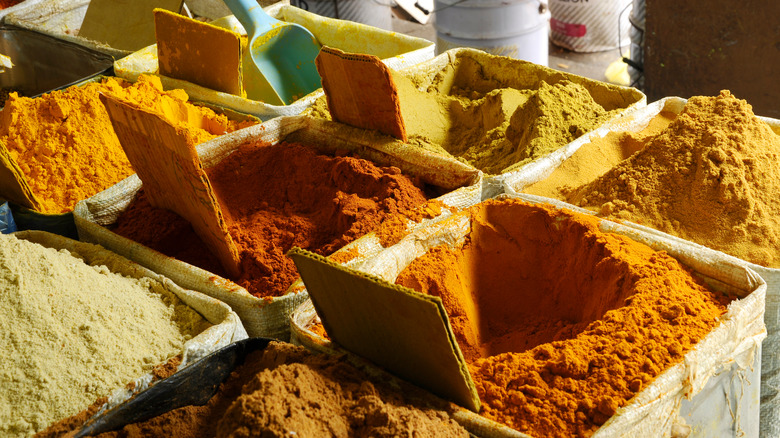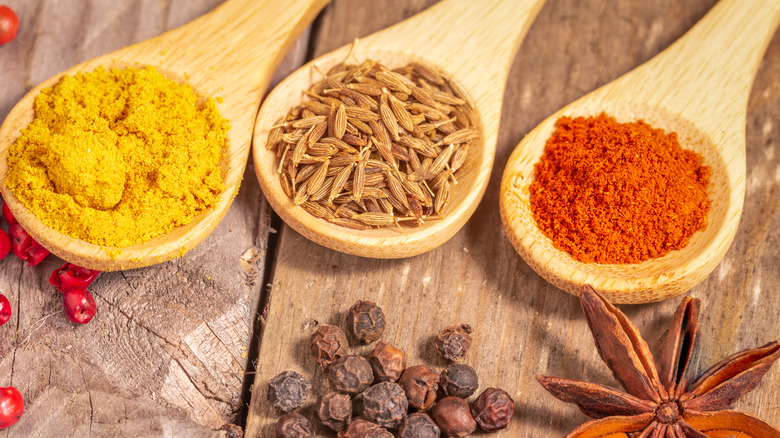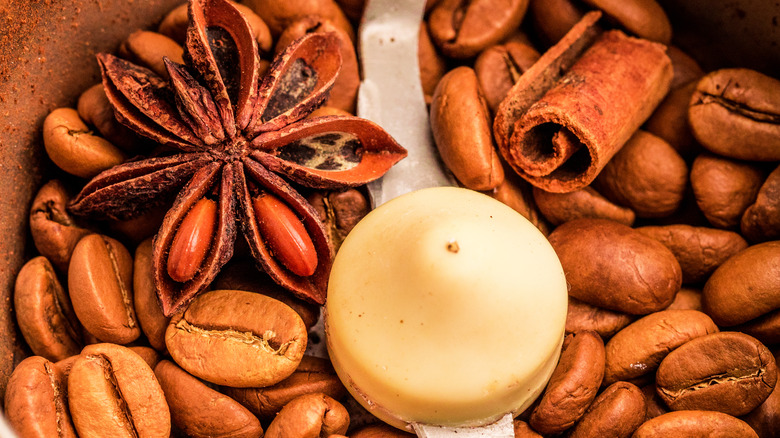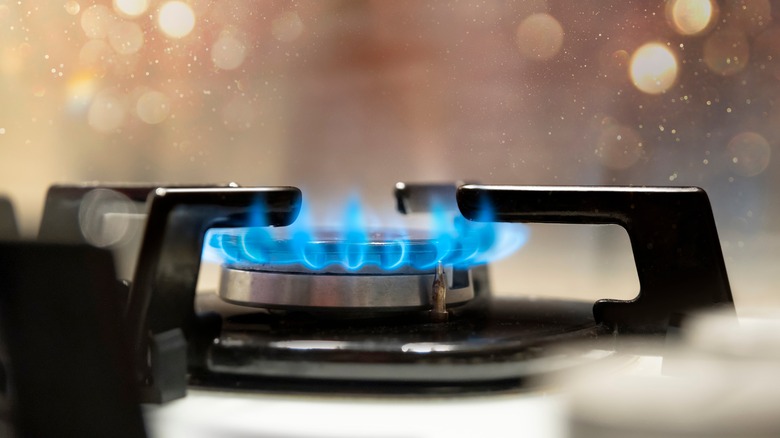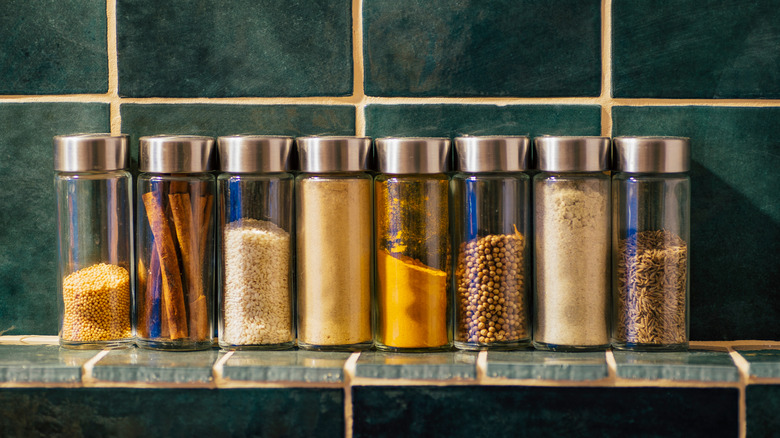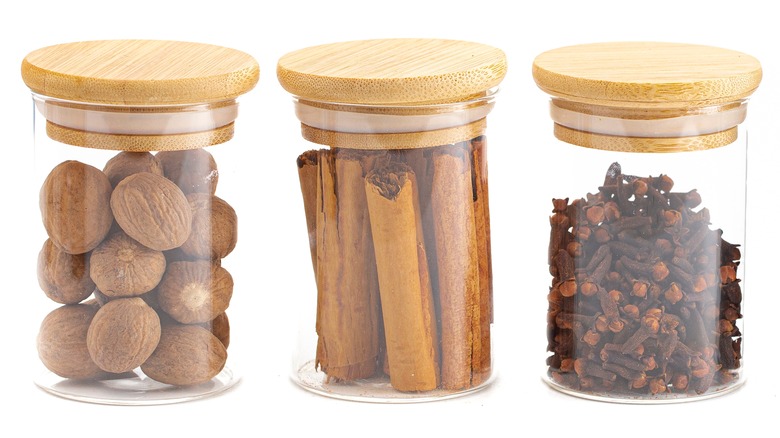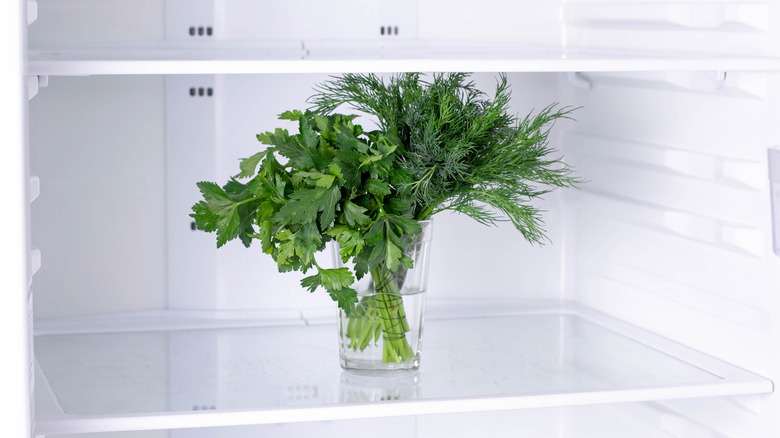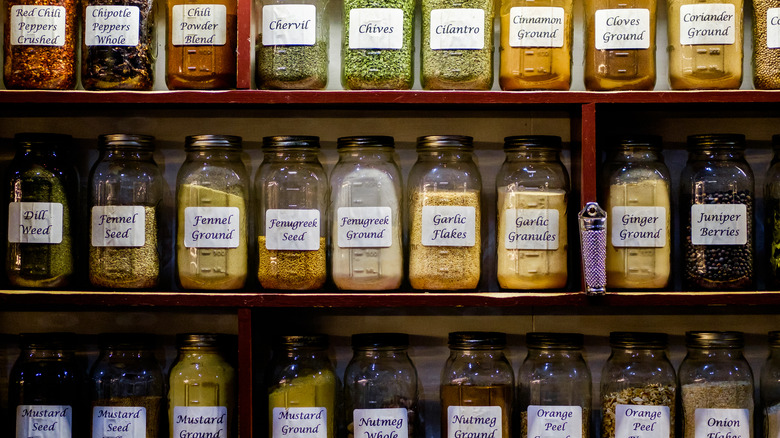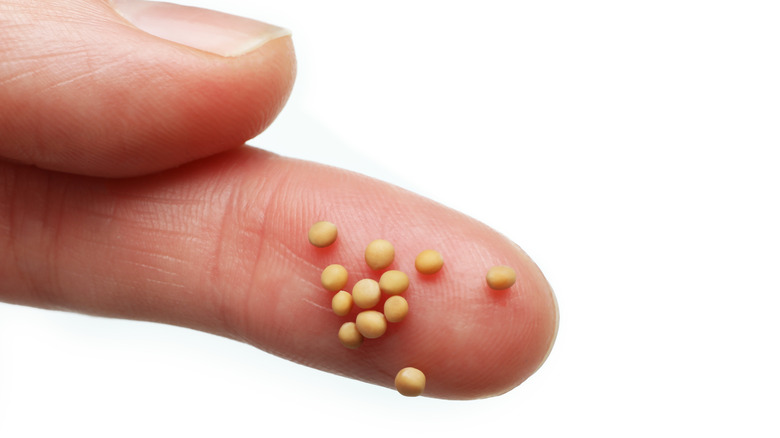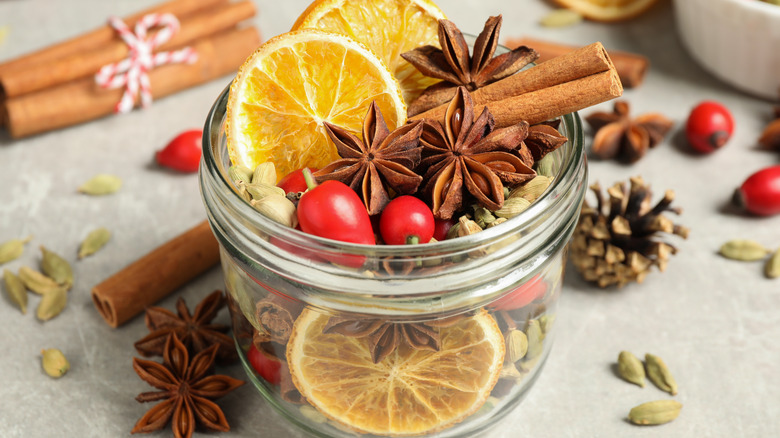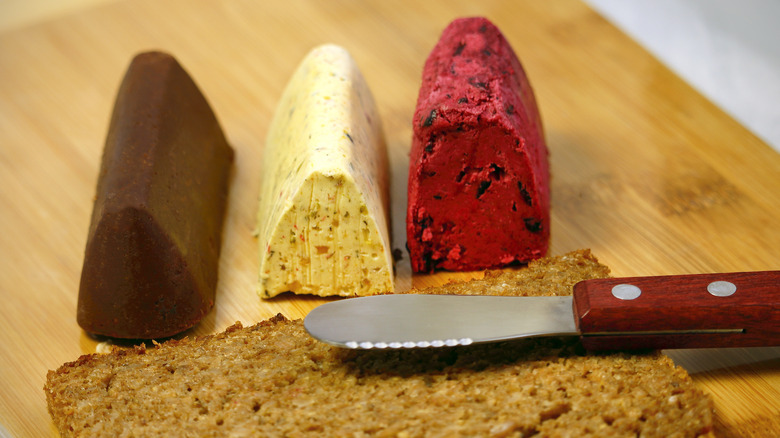How To Store Spices And Keep Spices Fresh
They say variety is the spice of life, so it's a good thing there is such a wide variety of spices. And while these seasonings are an integral part of cooking, they have long been used for so much more and are an important part of human history.
Many cultures have used spices in traditional medicine and as natural preservatives. Research carried out by multiple universities supports their efficacy as a food preservative. Similarly, a study published in the Journal of AOAC International found that the high amount of phenolic compounds in spices such as cinnamon, clove, and oregano makes them good sources of beneficial antioxidants. This means they may help fight against certain chronic illnesses, though more research needs to be carried out.
These days, in the United States, we may find flavorings such as vanilla bean or saffron expensive, but there was a time when black pepper was once so valuable it was called "black gold" and was used to pay for taxes, rent, and even ransoms. And while salt isn't technically a spice (it's a mineral), it also once carried monetary value. In fact, the word "salary" comes from the word "salt" (via Online Etymology Dictionary).
Now that you know more about how special spices can be, you probably want to know how to store them and keep them fresh. No worries, we've got you covered.
Choose a brand with high turnover
To ensure your spices stay fresh as long as possible, pick a brand that has a high turnover of its products. Consumers on Ranker voted Simply Organic as their favorite seasoning brand, followed by Spiceology and McCormick. Simply Organic states that it marks the freshness date on all its products. That way, you know how long the spice has been sitting on the grocery store shelf when you buy it.
Another great option is to source your flavorings from a small retailer, many of which sell their products online. Vice recommends Burlap & Barrel and Spicewalla. Burlap & Barrel specializes in equitable sourcing from small farms, stating that it ensures its products are fresher than supermarket brands. Meanwhile, Spicewalla says it purchases and processes its spices in small batches.
You can also try your luck by searching through Etsy to find unique spice blends and even containers or storage solutions for your spices.
Buy spices in small amounts
It may seem like you are saving money if you buy your seasonings in bulk, but in the long run, you won't be. Since you likely won't finish them before they stop tasting their best, you'll need to toss them and buy more, which means that you will ultimately be losing money. In short, spices are one of the things you should never buy in bulk.
Of course, there are exceptions to this rule of thumb. For example, if you know you'll use them up within the year (and they're fresh when you buy them), you will save money buying more. To that end, whole spices last longer than ground, so if you buy them in bulk, go for the whole variety. Cinnamon, in particular, is an excellent option to buy in large quantities, as it is often used in its entire form and stays fresh for about two to three years (per Simply Organic).
Be selective
We all have that one bottle of seasoning hidden in the back of our cupboard that we bought for one recipe (that we now have no idea how to use up)! To avoid that, either purchase minimal amounts or use substitutes for flavorings you don't think you'll use again (such as one of these alternatives for chili powder).
That said, there are some essential spices to have in your pantry. Besides salt and pepper, this includes bay leaves, cayenne pepper, cinnamon, cumin, garlic powder, ginger, nutmeg, oregano, and paprika. If you want premixed spice blends in your arsenal, go with chili powder and curry powder. With these simple seasonings, you'll be able to cook a variety of cuisines without worrying about wasting space or money.
You can also make your own spice blends, which saves on storage space and will keep your flavorings fresh since you'll be using more of them and buying fewer. Consider making your own spice blends from around the world. For example, the simplest versions of Moroccan ras el hanout can be made from cinnamon, turmeric, ginger, cardamom, clove, and cumin. Come fall, don't worry about purchasing a bottle of pumpkin pie spice. Make your own, precisely to your own taste, with a mixture of cinnamon, nutmeg, ginger, clove, allspice, and cardamom (you can even add dried citrus peel if you're feeling fancy).
Buy and grind whole spices
Whole spices last about twice as long as ground. Seasoning retailer The Spice House recommends buying certain spices whole and in bulk. When you grind them yourself, you'll always have tasty flavorings at your fingertips. However, it's worth noting that milling them lets out essential oils (in other words, their flavor), so you must be mindful of this practice.
So how should you grind your spices? You can use a manual mill, but that's not the best way to grind black pepper and other seasonings. The unexpected kitchen tool you can use to grind spices is actually your coffee grinder. This, or an electric spice mill, is a better option because not only do you get a finer grain, but it heats up your spices while blending.
You'll need to clean it out between spices, so you probably will want to have a separate grinder for your coffee and your seasonings. Even then, you'll still want to clean out your mill. The simple trick to cleaning your electric spice grinder is using bread or rice. You shouldn't wash your mill with soap and water because the water can sneak into the inside of the machine and damage it. So, instead, grind up dry bread and use those for bread crumbs. Or, use 3 to 4 tablespoons of rice to clean out the device.
Don't store your spices near heat
It might be convenient to keep your spices near your stove where you cook, but it's not ideal for keeping them tasty. Seasonings need to stay cool to stay fresh and extend their shelf-life. The Canadian Spice Association states that you shouldn't store your spices at more than 68 F or in an area with more than 60% relative humidity; too high a humidity can cause your spices to clump (via Eat by Date).
According to Ohio State University, a pantry is a suitable place for spices. If you don't have this separate storage space, drawers and cupboards farthest from heat sources are your best bet. If you need to have your seasonings closer to your cooking environment, only keep small amounts that you'll use up quickly, or premeasure them before you start cooking. This way, you won't be scrambling in the middle of cooking, and you'll be able to keep your spices fresh and tasty for longer.
Keep your spices away from sunlight
When your seasonings are exposed to light, they lose their flavor faster. That is because light usually equals heat. As Spices Inc points out, higher temperatures cause spices to dry out, sapping away their oils — where their flavor lives. Remember: no oil, no taste.
So, while displaying your spice jars on your windowsill or countertop might look pretty, it's not a good idea if you want long-lasting seasonings. Since they hate the light, keep them in a dark place, like a cupboard or pantry.
We get it; spices inside clear glass jars make for a beautiful kitchen aesthetic. So, if you'd like to keep your flavorings somewhere out in the open, ensure it's an area away from sunlight and the stove or oven. Again, it's best to only store small amounts of spices in their containers so that you will use them up quickly.
Make sure your spice containers are airtight
Moisture is the enemy of spice, which is why you need to keep them in airtight containers. Likewise, never sprinkle them over hot food or use a wet spoon to measure them (via Eat by Date). If you ever wondered why your seasonings are clumping or sticking together, humidity is why. According to the New York Times, the ions in salt attract water out of the atmosphere, which causes it to clump up in humid weather — or when it comes in contact with moisture from your food.
If you live in a high-humidity environment, you'll need to give your spices an extra leg-up in their fight against it. So, try adding silica gel packets, beans, or rice to your spice jar. While you shouldn't eat the silica gel, according to The Packaging Company, it is perfectly safe to use. However, make sure you purchase your own silica gel packets to ensure they can be utilized with food.
If you are using rice or beans, confirm your container has a shaker top with holes smaller than the grains or beans. You don't want to sprinkle some garlic powder in your sauce only to find yourself crunching down on a partially cooked black bean.
Be sure to use glass containers
You need to make sure your spice containers are non-porous. Healthline states glass, ceramic, and plastic are popular choices for seasoning storage. However, glass and ceramic are more airtight and easier to clean than plastic. Meanwhile, plastic has the downside of picking up the smell of flavorings, which makes it hard to reuse the containers. Metal and tins aren't the best options since they heat up quickly, which can affect the quality of your spices.
Glass is an ideal choice for storing seasonings because it's transparent, and you can easily take stock of what and how much you have, as well as the visual quality. You'll be able to keep track of a spice's color and texture.
A glass container also lets you easily see if any creepy crawlies have invaded your seasonings. Pantry moths — those little moths you sometimes see flying around your flour — enjoy spices, too.
Only keep select spices in the fridge
There is some debate about whether you should keep seasonings in your fridge. According to healthline, some people prefer to store red peppers — such as paprika and chili powder — in the refrigerator, believing it helps retain the color. But spice purveyor Spice Jungle states that the fridge is too humid a place for your flavorings and can actually encourage mold and bacteria growth.
If you must store seasonings in cold storage, consider your freezer or vacuum-seal them. It's also better to keep them whole. However, Rodelle warns never to put vanilla beans or extract in the fridge; the low temperatures can reduce their quality and make the extract cloudy.
Although putting spices in the fridge may not be a great choice, you should definitely keep your fresh herbs in there. Also, consider storing sesame seeds and other seasonings with high oil content in the fridge to prevent them from going rancid.
Organize them properly
An integral part of storing spices is how you organize them. That way, you'll always know what you have on hand and be able to find it quickly. FoodPrint recommends labeling your seasonings with their names and the date you bought them.
Then, organize the containers in a way that makes sense to you. This could be alphabetical, by purpose, or by cuisine. The main idea is that they should be easily accessible, and you should be able to see what you readily have.
As for how you actually keep your spices organized in your pantry, cabinet, or drawers, there are a few different things you can do. You can purchase shelf stairs or a turntable, a spice rack, or, in the case of a drawer, lay them flat (via McCormick). As long as you can see all your seasonings at a glance, any of these methods will work.
Learn when spices are past their prime
According to healthline, seasonings don't really "go bad." They just lose some of their strength of flavor. Additionally, the form of the flavoring changes how long it will stay fresh; as a rule of thumb, whole spices and herbs remain fresh for about two years and last longer than their ground counterparts.
To test whether your seasonings are past their prime, you should first smell them. If they still have a strong scent, all is well. If the herb isn't smelling so pungent, take a small amount and crush it between your fingers; if you're not getting any aroma from the spices or herbs, neither will your food. The final step is to taste them; if they have flavor, they're still good.
Of course, if you find moths or bugs in your spices, throw them out immediately and inspect the rest of your pantry for signs of an infestation (via Almanac).
Freshen up dead spices
If you do end up with seasonings that are past their prime, all is not lost. There are some hacks to try to bring them back to life. For one, you can try toasting or frying them. According to McCormick, this will draw out their essential oils and extract whatever flavor is left. If you want to toast your spices, heat them in a skillet on medium-low until they are fragrant. Then, remove them immediately. McCormick also recommends letting the flavorings cool completely before placing them back into their bottle for storage. If you prefer to fry old spices, heat them up in oil right before cooking.
You can also do some arts and crafts with your expired flavorings. Try making soaps, candles, dyes, or even a spice potpourri. These DIY projects are a fun way to reduce waste and create homemade gifts (via Real Simple).
Use your spices
Of course, the best way to keep your spices fresh is to actually use them! That way, you won't keep the same container in your pantry for years. There are many dishes you can make that are spice-forward.
A simple spiced apple cake recipe is a great way to use up a blend of your choosing. This cake calls for "mixed spice," which is a combination of allspice, cinnamon, cloves, coriander, ginger, mace, and nutmeg. If you make your own mix, you can control the ratios and adjust as you see fit.
Another great way to use up seasonings is by making compound butter, such as this honey-curry compound butter. It will really highlight your spices' flavors. They're a great way to use up extra flavorings you may have lying around. You can also try making your own unique seasoning mixes, such as this dukkah nut and spice blend recipe. Practically every cuisine in the world uses spices and herbs, so the possibilities are indeed endless.
